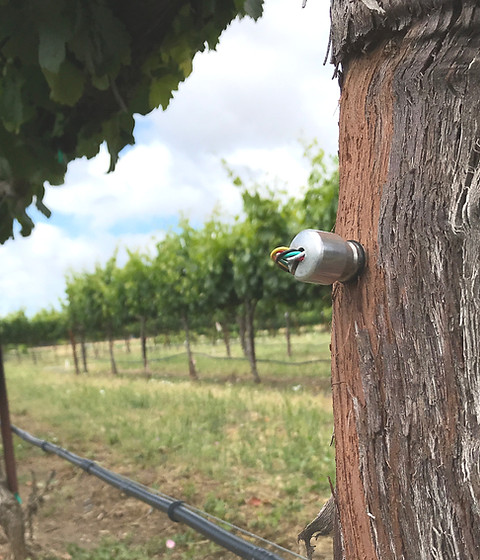Since launching in 2015 through eLab, FloraPulse has been working to help growers optimize water use. The startup’s water stress sensor, a microchip tensiometer, is embedded into trees’ woody tissue to directly measure the water status.
“Using our technology, the growers can actually irrigate according to what the trees need because if you just look at a tree, it’s hard to tell if it needs water or not,” said Michael Santiago, CEO and founder. “By the time it’s obvious, it’s too late.”
Recently, FloraPulse received a $175,000 Small Business Innovation Research (SBIR) award from the United States Department of Agriculture (USDA) to adapt the technology to small-stem plants.
“We received this award to take what we’ve built and then tune it so that it can be used in more crops,” Santiago said. “The funding is being used to develop a sensor for smaller crops, which includes the really small grapevines for wine, as well as blueberries and corn.”
The sensor provides growers with accurate and reliable readings, along with irrigation recommendations based on the measurements. According to Santiago, the new sensor’s size will not change, but it will be installed differently to maintain its efficacy with smaller plants.
By improving irrigation efficiency, increasing crop yield, and enhancing crop quality, users will be able to save money while growing better crops.
FloraPulse’s technology helps not only growers, but also the planet. Agriculture accounts for 70% of water use by humans worldwide, making it the largest single consumer of the limited resource. With climate change and increasing drought frequency, water efficiency is crucial.
“Water is the biggest input in agriculture, and it has a huge effect on the yield, the quality, the health of the plant,” said Santiago. “It’s a very important input to manage.”
Until FloraPulse came along, water management involved a lot of guesswork — the company’s sensor is the only product of its kind that can measure the thirst of plants.
“The ability to listen to what the trees are saying translates to sometimes 15–20 percent increased yield,” said Santiago. “It helps growers save water, increase yield, and also just have a bit of peace of mind that they’re doing things the right way.”
Over the years, FloraPulse has grown substantially. Santiago said the company has been multiplying sales by four times over the last few years and is on track to accomplish that again this year.
Since 2017, FloraPulse has been awarded more than $1 million in SBIR funding from both the USDA and the National Science Foundation (NSF).
On top of that, the company’s technology is now used on almost every continent, including countries in North and South America, Africa, Europe, and Australia.
Santiago said eLab provided the business with a strong foundation, valuable guidance, and a motivating community.
“I think some of the biggest value is just seeing other people doing the same thing you’re doing or have done it,” he said. “A lot of it is learning by example. It was just helpful to see this is possible.”
One of Santiago’s main takeaways from eLab was understanding the value of a good business presentation.
“That’s so important, being able to pitch correctly,” he said. “Everything I do as a CEO involves convincing people. I convince investors, funding agencies, our employees, customers, interns, collaborators, so these lessons of how to pitch and sell the story have been just critical.”
In addition to eLab, Santiago utilized the Center for Technology Licensing, the Johnson Shark Tank competition (which FloraPulse won in 2015), and pre-seed workshops from the McGovern Center during his time at Cornell University.
“I am thankful for all the support we’ve received from so many different collaborators over the years, including Cornell but also research collaborators, funding agencies, students, and employees,” said Santiago. “It’s really been a huge team effort involving hundreds of people at this point.”

